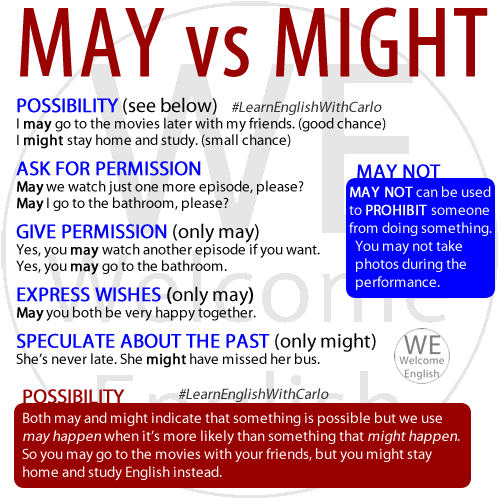In English, both may and might are modal verbs used to indicate possibility. However, they aren’t interchangeable in all situations. Knowing when to use each one can improve the accuracy and clarity of your communication.

May: A Stronger Possibility
May is often used when something is more likely to happen. When we say something may happen, we suggest that the chances of it occurring are reasonably high. For example:
- “You may go to the movies with your friends.”
In this case, there is a good chance that you will go to the movies. The outcome is likely.
Might: A Weaker Possibility or Uncertainty
Might is used when the possibility is less certain, or when we want to express doubt about whether something will happen. For example:
- “You might stay home and study English instead.”
Here, the chance of staying home is less certain or unlikely compared to going out with friends. Might often carries an undertone of uncertainty or a weaker possibility.
Might as the Past Tense of May
When referring to past events, might is used as the past tense of may. For example:
- “She might have gone to the movies yesterday.”
In this context, we are talking about a possible event that could have happened in the past.
Might for Negative Outcomes
It’s also important to use might when discussing negative outcomes, even if they seem likely. This is because using may in these cases can be confusing—it might sound like you’re giving permission rather than talking about a possibility. For example:
- “You might fail the test if you don’t study.”
Using may in this context would sound odd, as it could imply you’re allowing or permitting failure. Using might ensures the sentence focuses on possibility, not permission.
Quick Recap:
- Use may when the outcome is likely.
- Use might when the outcome is less likely or uncertain.
- Use might for past possibilities.
- Use might when referring to negative possibilities to avoid confusion with permission.
Mastering these subtle differences will help make your English sound more natural and precise.
